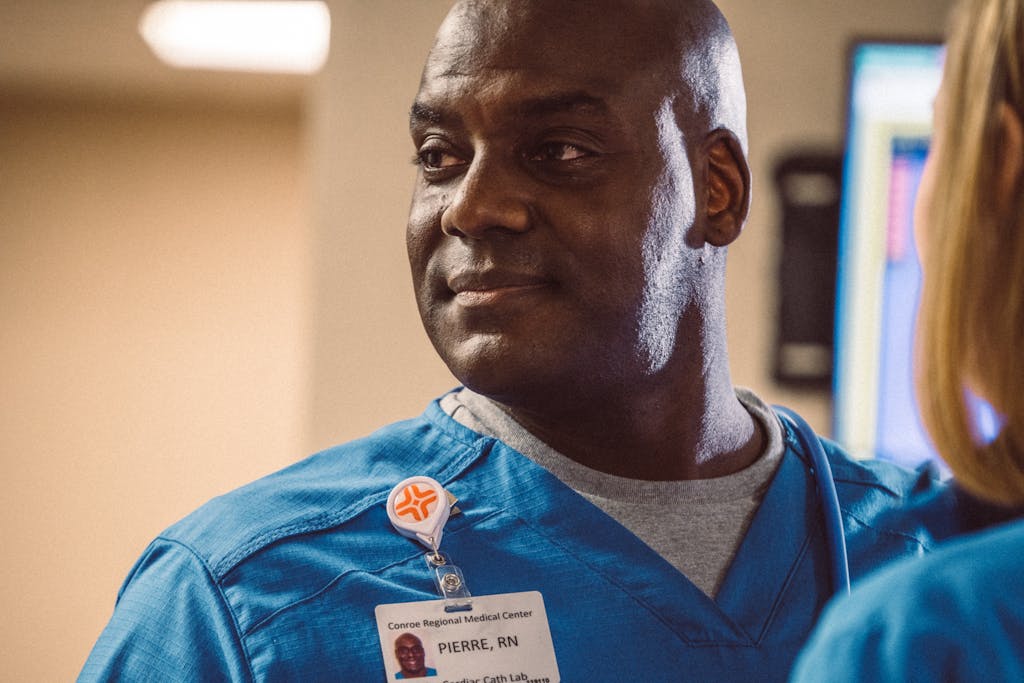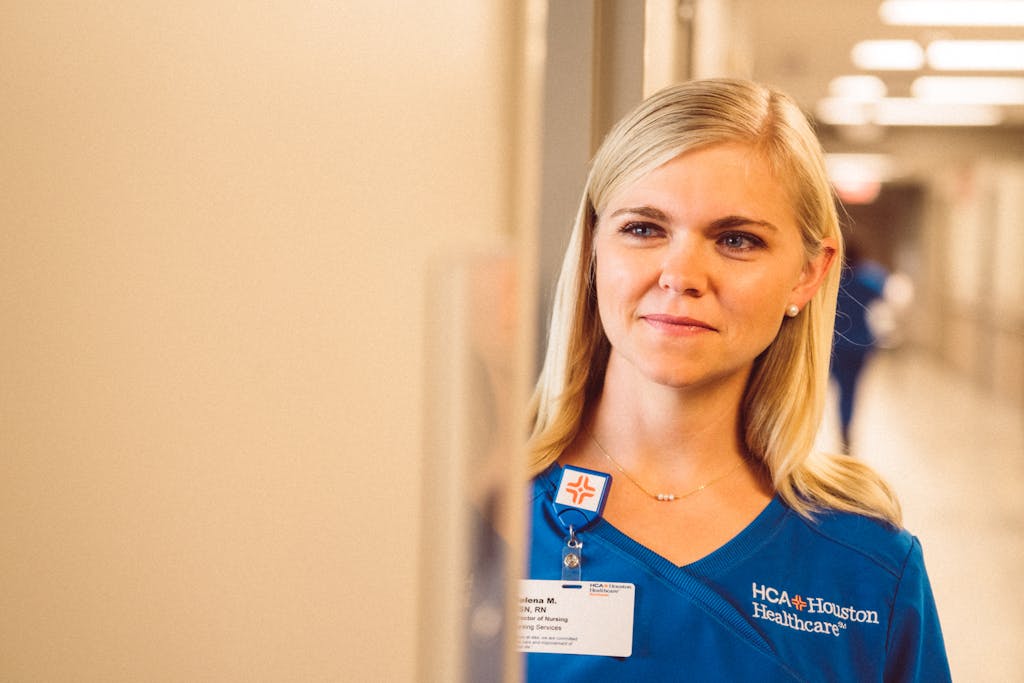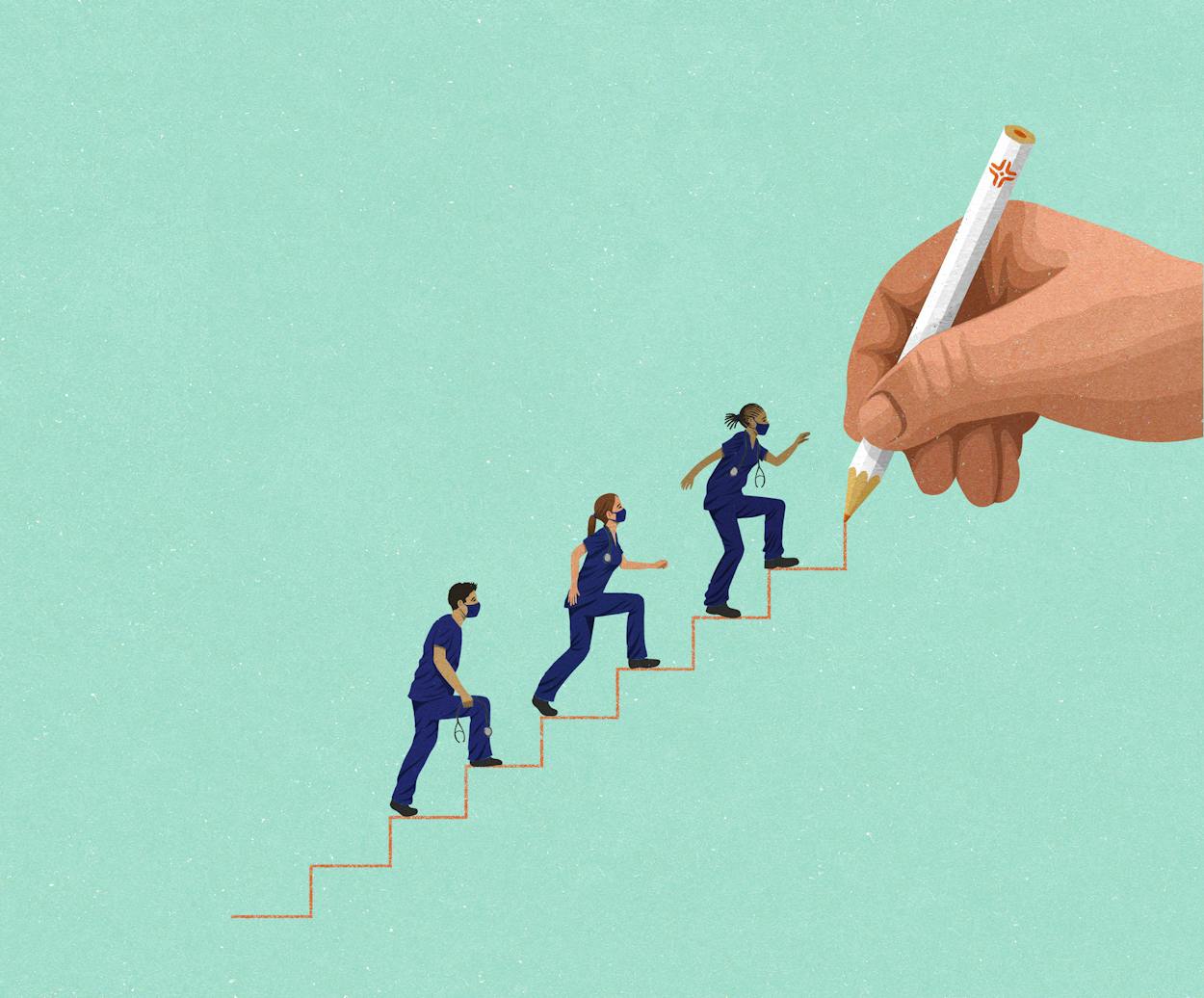In early 2021, Kathryn Tart met a pharmacist at a COVID-19 vaccine distribution center in Houston. Like many others at the site, the woman was volunteering her time to help the hundreds of Houstonians in line for the shot.
“I knew right away something was really affecting this woman,” says Tart, the founding Dean at the University of Houston’s College of Nursing. “I don’t know why, but eventually she approached me, and she had tears in her eyes. ‘I have to be here,’ she told me. ‘I have to be here.’”
The pharmacist told Tart that her cousin had recently lost her life to the coronavirus. Her cousin was a nurse, working tirelessly to help patients battle COVID-19.
“She told me all about this amazing nurse in her life,” Tart says, “and then she collapsed in my arms and sobbed.”
Over the last year, Tart has accumulated many stories just like this one.
“Everyone is touched in some way by a nurse,” she says. “We’re given a view into people’s lives that is very rarely seen by others, and to me, that’s sacred.”
But as the COVID-19 pandemic continues, nurses continue to grapple with the extreme pressures and difficulties of their jobs. Despite being hailed as heroes throughout this crisis, healthcare workers are coping with enhanced levels of stress, trauma, and exhaustion. Meanwhile, according to the Center for Houston’s Future, the city is short roughly 3,600 nurses, a deficit that could grow even wider in the coming years.
“Burnout caused by the pandemic could make the shortage even worse,” says Brett Perlman, CEO of the Center for Houston’s Future. “In order to make sure that doesn’t happen, you need a strong pipeline that finds amazing nurses while taking care of them every step of the way.”

HCA Houston Healthcare is committed to doing exactly that. Even while it contends with a devastating pandemic, the healthcare network’s leaders and nurses are taking care of their nurses, addressing the labor shortage, and planning for the future—a future they will help lead.
“We’ve never veered from our nursing strategic plan,” says Kelli Nations, the Chief Nurse Executive at HCA Healthcare’s Gulf Coast Division. “We may have paused some things as we focused on our patients during this pandemic, but we’ve never stopped investing in our nurses.”
That investment takes several different forms. For instance, HCA Houston Healthcare offers nursing students tuition reimbursement plus employment and a 401(k)—all while they are still in college. They also offer students loan repayment.
HCA Houston Healthcare’s most integral partner is the University of Houston. Back in May 2019, the network awarded the university a $3.5 million grant, part of which was earmarked for additional professors. This summer, HCA Houston Healthcare nurses will join the university as new adjuncts, and having more professors opens up more classes for more nurses seeking bachelor’s degrees. That, in turn, leads to better patient outcomes. Research indicates that a higher ratio of nurses with bachelor’s degrees leads to less errors, lower rates of hospital-borne infections, and lower mortality rates.
We may have paused some things as we focused on our patients during this pandemic, but we’ve never stopped investing in our nurses.
Kelli Nations, Chief Nurse Executive at HCA Healthcare’s Gulf Coast Division
Plus, Nations is confident that nurses who enroll at the University of Houston are getting the best education possible.
“Everyone knows you have to be compassionate to be a nurse,” she says, “but you also have to be incredibly resilient and incredibly smart. You’re talking about a person who must collaborate with physicians, therapists, and social workers; coordinate care for hundreds of patients; and work 12- to 14-hour shifts on a regular basis. There’s no better place to get training for this career than the University of Houston.”

However, increasing the number of well-trained graduates is only part of addressing the shortage. To ensure great nurses stay in the field, hospitals must take care of their nurses’ mental and physical health.
“Many nurses have post-traumatic stress disorder,” Tart explains. “And since nurses don’t charge for services, we can sometimes be at the bottom of the totem pole. A lot of the work we do isn’t seen as important.”
Nations, who worked as a registered nurse for nearly two decades, wants that to change, and she’s taking key steps to take care of the nurses at HCA Houston Healthcare. Throughout the pandemic, the network has enhanced its employee assistance programs, given nurses meals to take home to their families, offered hotels at no cost, and prioritized their nurses’ mental health.
“We’re arming all of our colleagues with information on how to have conversations about mental health,” Nations says. “I always want to be optimistic, but we also have to be realistic. We have to meet people where they are, and do everything we can to make them safe, protected, and cared for.”

Like Kathryn Tart, Kelli Nations has plenty of stories from this past year in nursing. But one image remains fixed in her mind: the sight of a crew of critical care nurses at work during the first few days of the pandemic.
“Seeing those first patients was really difficult, because we weren’t 100 percent sure what the best treatment was,” she says. “I just remember the faces on those nurses as they walked into the room to see their patients. They didn’t have every single answer, but they were calm. They were ready.”
Tart is no stranger to that courage. She sees it in her mother-in-law, a school nurse, and she sees it in the aspiring nurses she meets at the university. No matter what the future holds in Houston, Tart knows that nurses will face it head-on.
“The same day I met that pharmacist, I was talking to my husband,” she says. “He was worried about me being out there, but I told him, ‘I’m a nurse. I have to be out there.’”







